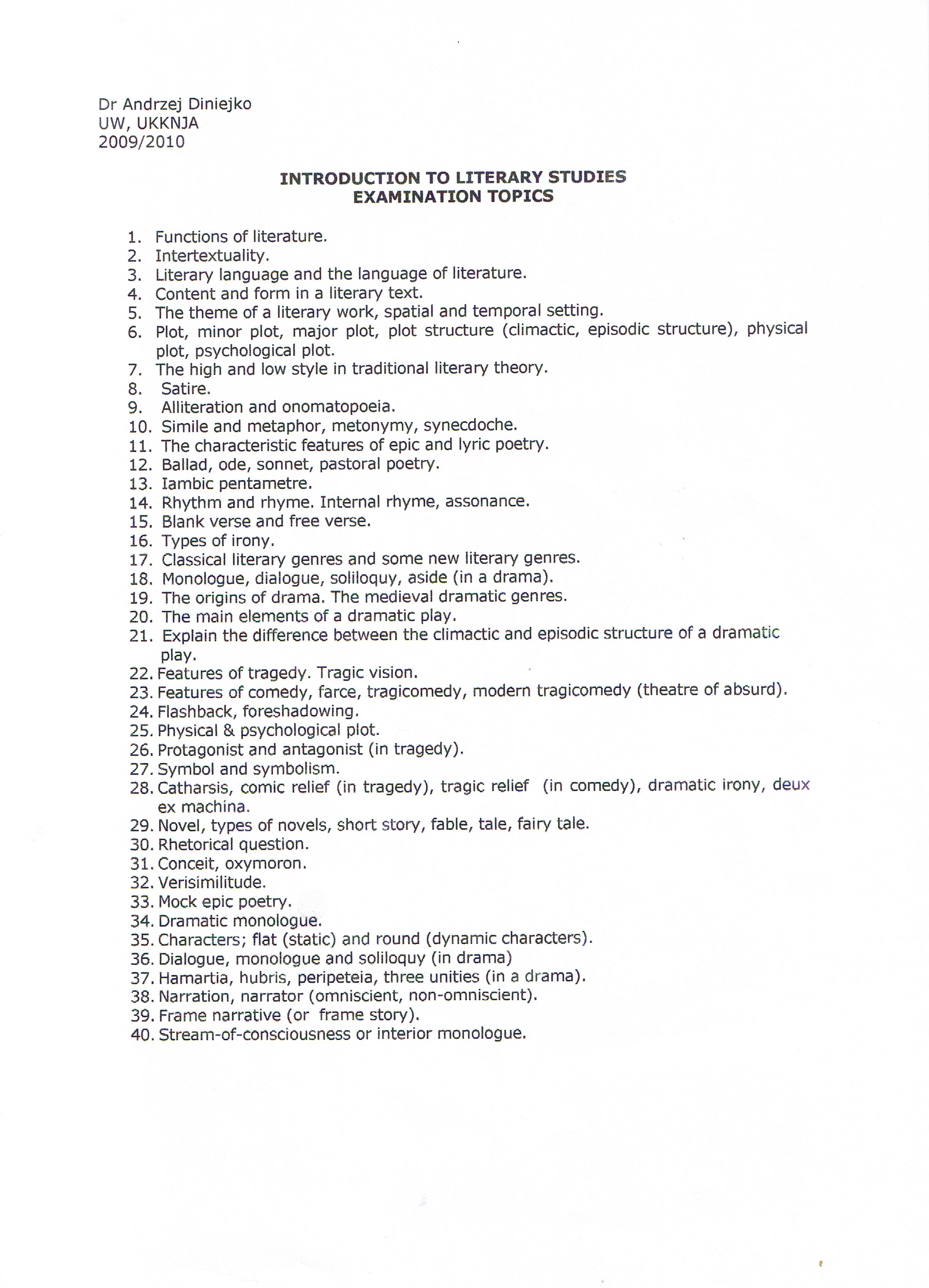pisemny

Dr Andrzej Diniejko UW, UKKNJA 2009/2010
INTRODUCTION TO LITERARY STUDIES EXAMINATION TOPICS
1. Functions of literaturę.
2. Intertextuality.
3. Literary language and the language of literaturę.
4. Content and form in a literary text.
5. The theme of a literary work, spatial and temporal setting.
6. Plot, minor plot, major plot, plot structure (climactic, episodic structure), physical plot, psychological plot.
7. The high and Iow style in traditional literary theory.
8. Satire.
9. Alliteration and onomatopoeia.
10. Simile and metaphor, metonymy, synecdoche.
11. The characteristic features of epic and lyric poetry.
12. Ballad, ode, sonnet, pastorał poetry.
13. Iambic pentametre.
14. Rhythm and rhyme. Internat rhyme, assonance.
15. Blank verse and free verse.
16. Types of irony.
17. Classical literary genres and some new literary genres.
18. Monologue, dialogue, soliloquy, aside (in a drama).
19. The origins of drama. The medieval dramatic genres.
20. The main elements of a dramatic play.
21. Explain the difference between the climactic and episodic structure of a dramatic play.
22. Features of tragedy. Tragic vision.
23. Features of comedy, farce, tragicomedy, modem tragicomedy (theatre of absurd).
24. Flashback, foreshadowing.
25. Physical & psychological plot.
26. Protagonist and antagonist (in tragedy).
27. Symbol and symbolism.
28. Catharsis, comic relief (in tragedy), tragic relief (in comedy), dramatic irony, deux ex machina.
29. Novel, types of novels, short story, fable, tale, fairy tale.
30. Rhetorical question.
31. Conceit, oxymoron.
32. Verisimilitude.
33. Mock epic poetry.
34. Dramatic monologue.
35. Characters; fiat (static) and round (dynamie characters).
36. Dialogue, monologue and soliloquy (in drama)
37. Hamartia, hubris, peripeteia, three unities (in a drama).
38. Narration, narrator (omniscient, non-omniscient).
39. Frame narrative (or frame story).
40. Stream-of-consciousness or interior monologue.
Wyszukiwarka
Podobne podstrony:
ustny Dr Andrzej Diniejko 1. Williams Carlos Williams, This Is Just to Say 2.
Podstawy Psychologii i Socjologii Skrypt wykładów - dr Mirosław Łoboda Semestr zimowy 2009/2010
LOGIKA 2009/2010 (studia niestacjonarne) Prof. dr hab. Tomasz Gizbert-Studnicki dr Andrzej
est1 Dr Dariusz Pniewski Spis lektur na egzamin z estetyki XIX wieku (rok akademicki 2009/2010) Lckt
skanuj0001 i *0/ 6ssPsychologia religii - ćwiczeniaRok akademicki 2010/2011.Syllabus Prowadzący: dr
więcej podobnych podstron